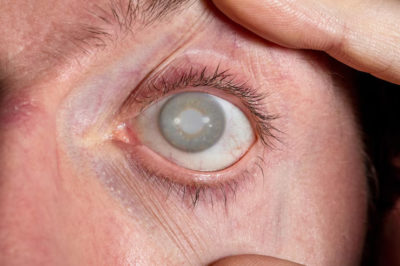Trudging the complexities of eye health requires an understanding of when to seek medical advice, especially as vision changes become apparent. Recognizing early warning signs of prevalent conditions that cloud the lens and progressively diminish vision quality is essential for timely intervention. This guidance aims to illuminate the path for individuals noticing subtle yet significant changes in their vision, underscoring the importance of professional evaluation.
Symptom #1: How Can Blurred Vision Be A Symptom Of Cataracts?
- Blurred vision, a key symptom of cataracts, results from the lens of the eye becoming clouded, disrupting light passage and decreasing vision quality.
- This condition, often part of natural aging, can also result from diabetes, UV exposure, smoking, and certain medications.
- Recognizing this symptom entails noticing a decrease in the sharpness of vision, with objects appearing out of focus.
- A comprehensive eye examination by specialists, particularly in facilities like Dr Agarwals Eye Hospital, is crucial for diagnosing cataracts.
- If significant vision impairment is diagnosed, cataract eye surgery, a common and safe procedure, may be recommended to restore vision clarity.
Symptom #2: Are Glares In Vision To Be Taken As A Symptom Of Cataracts?
- Glares, bright and overwhelming lights that make it difficult to see, indicate cataracts’ development as they scatter light entering the eye.
- This symptom can impair the ability to drive at night or perform daily tasks.
- Consulting an eye care professional is crucial for anyone experiencing glares, as a comprehensive eye examination can diagnose the presence and severity of cataracts.
- Understanding the impact of glares on daily life is essential, and cataract surgery may be advised to alleviate these symptoms.
- Upon diagnosis, if the cataract significantly impairs vision and affects daily activities, cataract eye surgery might be recommended.
- This surgery is one of the most common and safe procedures, involving the removal of the cloudy lens and, in most cases, its replacement with a clear artificial lens.
- Eye treatments in Dr Agarwals Eye Hospital, among other leading facilities, utilize state-of-the-art technology and techniques to ensure optimal outcomes for patients undergoing cataract surgery.
Symptom #3: How Can Halos In One’s Vision Mean They Need Cataract Surgery?
- Halos, bright circles around light sources, signal the scattering of light due to cataract-induced lens clouding.
- Noticing halos, especially in low light conditions, suggests that cataracts might significantly affect vision and quality of life.
- An eye examination by a specialist can confirm cataracts’ presence, with treatment options discussed based on the condition’s severity.
- Cataract surgery, involving the replacement of the clouded lens with a clear artificial one, may be necessary to restore clear vision.
- The first step for anyone experiencing halos in vision is to book a doctor appointment with an eye specialist.
- This is essential for obtaining a proper diagnosis and understanding the specific cause of the glares.
Symptom #4: Why Should Poor Night Vision Be Taken Seriously As A Possible Symptom Of Cataracts?
- Poor night vision, or difficulty seeing in low light, reflects significant lens clouding due to cataracts.
- This symptom, which risks safety and reduces quality of life, necessitates consulting with an eye care professional for a comprehensive examination.
- Discussing the impact of poor night vision on daily activities can help assess the need for cataract surgery, aimed at improving night vision by replacing the clouded lens.
- Consulting with an eye care professional is the first step toward diagnosing the cause of poor night vision and discussing the potential for surgery.
- For those concerned about the cost, it’s important to note that at an affordable price, all eye treatments are available, ensuring that patients can access the care they need without undue financial burden.
- Through proper diagnosis and treatment, individuals experiencing poor night vision due to cataracts can achieve improved vision quality and a better quality of life.
- However, for individuals whose night vision issues stem from refractive errors rather than cataracts, Lasik eye surgery could potentially improve their night vision by correcting the underlying issue.
Symptom #5: How Can Poor Color Perception Be An Indication That You Require Cataract Surgery?
Changes in color perception, where colors appear faded or less vibrant, can indicate cataracts.
- This symptom arises as the clouded lens affects light perception, making color differentiation challenging.
- Acknowledging changes in color vision and consulting an eye care professional for a comprehensive examination are vital steps.
- Cataract surgery may be advised to restore vibrant color perception by removing the clouded lens.
- A comprehensive eye examination will help determine the presence of cataracts.
- This exam includes evaluating the lens for signs of clouding and other cataract eye surgery symptoms.
Awareness and early detection, when it comes to eye care are paramount. Understanding and identifying symptoms that may necessitate surgical intervention highlight the importance of regular eye examinations and communication with eye care professionals. Recognizing these symptoms is the first step towards clarity and informed decision-making, enabling individuals to potentially see the world through a clearer lens once again.








